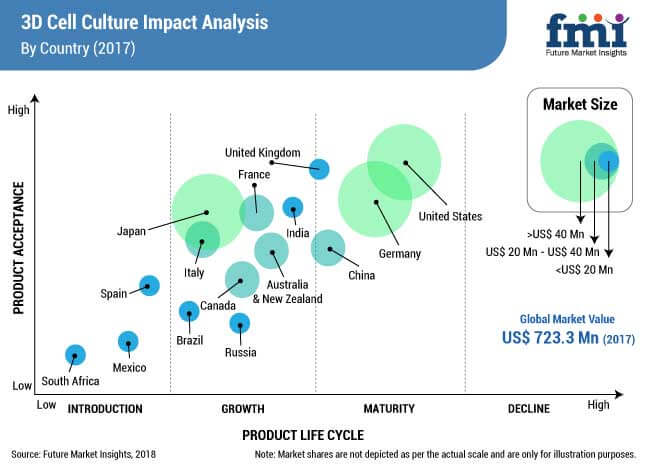~78.0% Revenue Contribution by Leading Manufacturers in the 3D Cell Culture Market
The 3D cell culture market is largely dominated by major key players such as Thermo Fisher Scientific Inc., Merck KGaA, Becton, Dickinson and Company, and Lonza, Corning Incorporated, and Synthecon, Inc. that serve various types of 3D cell culture products. The key manufacturers of 3D cell culture are focusing on research and developmental activities and they are also trying to focus on the clinical trial outcomes. Many companies are actively involved in acquisitions to introduce new innovative products in the market.
Increasing Focus on Oncology Drug Research
The awareness regarding oncological diseases is increasing among the population, which is expected to increase the growth of the 3D cell culture market. Cell culture is an important part of Oncology as it is involved in the clinical trials and also plays an important role to understand the morphology and physiology of the cells in a given environment. Cell-based culture is also used in drug development as it helps to understand various cellular pathways. Cancer research depends on cell-based assays comprising of in-vitro cell culture. Financial support for cancer research by governmental and non-governmental organizations is growing, resulting in significant growth of the 3D cell culture market.
Enhanced Resemblance to In-Vivo Environment
3D cell culture creates an artificial environment for the growth of the cells to study their behavior in response to the given environment. 3D cell culture is highly used for its convenience and innovative features as compared to other cell culture methods, which drive the 3D cell culture market.
3D cell culture represents a clear picture of the cell’s morphology. 3D cell culture is involved in a better representation of cell differentiation and proliferation. As compared to 2D cell culture, 3D cell culture gives a clear picture of the tissue organization. The efficiency of 3D cell cultures closely mimics the natural environment for culturing of cells and generate more accurate models of tissues is considered to be a driver of the 3D cell culture market.
Request Sample Report @ https://www.futuremarketinsights.com/reports/sample/rep-gb-2843
Cost-effective Drug Discovery
According to the European trade association, the research investment for drug discovery has grown by 5.2 times in the U.S. and 3.3 in Europe from 1990 to 2003.
The traditional methods of drug discovery are inadequate and less relevant to the pace of the growing life science research and development. 3D cell cultures are, therefore, expected to generate a major revenue share in the market for drug discovery application.
Rising Demand for Regenerative Medicine
Personalized medicine deals with the information of the patient and their genetic make-up. Personalized medicine makes better treatment options and therapies leading to better patient outcomes. It also predicts the treatment response of the patient before undergoing therapy or treatment.
3D cell cultures are mainly used to observe the cell interactions and the abnormal behavior of cells and play a major role in the development of personalized medicine.

Competitive Landscape of the Global 3D Cell Culture Market
The competition section of the 3D cell culture market represents the profiles of the key players operating in the 3D cell culture market based on the products they offer and the total revenue of the companies. Some of the key players featured in this report include Thermo Fisher Scientific Inc., Merck KGaA, Becton, Dickinson and Company, Lonza, and Corning Incorporated.
The key manufacturers of 3D cell culture offer a wide range of products. Thermo Fisher Scientific, Inc. has developed a joint platform for advancing research in precision medicine.
Corning, one of the major leaders in 3D cell culture market, manufactures cell culture products, which include consumables (such as plastic vessels, specialty surfaces, cell culture media, and serum), as well as general labware and equipment, which are used for advanced cell culture research.
Request to View Methodology @ https://www.futuremarketinsights.com/askus/rep-gb-2843
Definition
3D cell culture creates an artificial environment for the growth of the cells to study their behavior in response to the given environment. 3D cell culture can be defined as the culture of living cells which forms a three-dimensional structure and mimics a tissue or an organ. 3D cell culture is highly used for its convenience and innovative features as compared to other cell culture methods.
3D cell culture can be scaffold-free or scaffold-based 3D cell culture. Scaffolds are responsible for providing support to the cells.
No comments:
Post a Comment